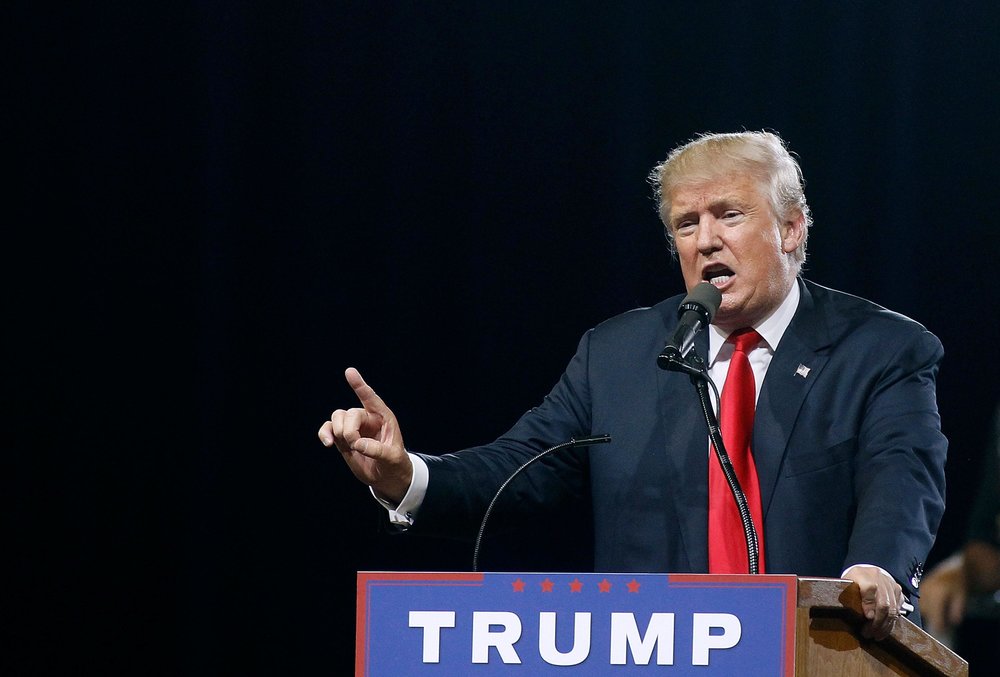Trump calls on Obama to veto UN resolution on Israeli settlements

The move risks sending mixed signals on U.S. foreign policy.
President-elect Donald Trump called Thursday on President Barack Obama's administration to veto a United Nations resolution that denounces Israeli settlements, backing the Israeli government and weighing in on a highly sensitive topic weeks before he takes office.
The resolution, a draft of which is being floated by Egypt, demands that Israel stop building settlements in territory claimed by Palestinians for a future state. According to reports, the draft text also says such settlement construction violates international law and is “dangerously imperiling the viability of a two-state solution.” The resolution was supposed to be considered for a vote Thursday, but was postponed amid an outcry from Israel.
In what appeared to be a full-court press on the topic, Trump used email, Twitter and Facebook to demand that the resolution be vetoed. Trump’s decision to make his stance known was striking in that, in theory, such matters are supposed to be left to the president still in charge to avoid sending mixed signals on US foreign policy, although Trump’s transition team said the White House was given a heads-up.
“As the United States has long maintained, peace between the Israelis and the Palestinians will only come through direct negotiations between the parties, and not through the imposition of terms by the United Nations,” Trump said in his emailed statement. “This puts Israel in a very poor negotiating position and is extremely unfair to all Israelis.”
In the past, the United States has vetoed such UN measures, saying they are unfair to Israel and undermine the peace process with the Palestinians. But it was not clear how Samantha Power, the U.S. ambassador to the UN, planned to vote. Her office declined to offer guidance, and it's possible that the U.S. was negotiating the wording behind the scenes, or trying to prevent the measure from coming to a vote.
Some advocates of a two-state solution hoped Obama would use his final weeks to make a last push for Middle East peace, even if it was purely symbolic. But Trump aides had warned the president not to make any major foreign policy moves during the transition period.
Anti-Israel solutions
Trump's statement came hours after Israeli Prime Minister Benjamin Netanyahu took to Twitter in the middle of the night in Israel to urge the United States to veto the measure. Through his spokesman Thursday morning, Netanyahu hailed America’s willingness to oppose “anti-Israel solutions” and “stand up” to the UN as “one of the great pillars of the U.S.-Israel alliance.”
“I hope the U.S. won’t abandon this policy; I hope it will abide by the principles set by President Obama himself in his speech in the UN in 2011: That peace will come not through UN resolutions, but only through direct negotiations between the parties,” he said. “And that’s why this proposed resolution is bad. It’s bad for Israel; it’s bad for the United States; and it’s bad for peace.”
Secretary of State John Kerry spoke to Netanyahu on Thursday morning, according to State Department spokesman John Kirby. “He has routinely had conversations with foreign leaders about the Middle East peace process, and I think certainly since the Egyptians submitted the text, that yes, he has had conversations with foreign leaders about this resolution,” Kirby told reporters.
The Israeli Embassy in Washington did not immediately respond to a question about whether Netanyahu or his aides had reached out to Trump; Trump aides also did not immediately respond to the same question.
A number of Democrats and Republicans also issued statements calling on the U.S. to veto the resolution, a sign of the still-strong bipartisan support Israel continues to enjoy in Congress.
House Speaker Paul Ryan, for one, backed fellow GOP member Trump and Netanyahu in a statement.
“These stunts at the UN serve only one purpose—to defame and delegitimize the democratic State of Israel,” Ryan said. “This resolution will undermine peace and mutual cooperation by pushing the parties further away from direct negotiations. The administration should veto it.”
Maryland's Ben Cardin, the ranking Democrat on the Senate Foreign Relations Committee, said the resolution would harm the stalled peace process. “This resolution is one-sided and unfairly calls out Israel without assigning any blame for the Palestinian role in the current impasse,” Cardin said in a statement.
Transition period
That the resolution was being circulated during the U.S. presidential transition period makes it all the more tricky for the parties involved, especially Obama, whose relations with Israel have been strained.
The president-elect has made it clear for months now that he is sympathetic to the Israeli view on issues such as settlements. Last week, Trump said he would nominate David Friedman, a bankruptcy lawyer with hard-right views on Israel, as his envoy to the Jewish-majority state. Friedman is a major booster of Israeli settlement construction in the West Bank, reportedly raising funds for such activity, which Palestinians and other Arabs have long decried as making it harder for them to build a Palestinian state.
Friedman has downplayed the potential for achieving a two-state solution. He also wants Trump to move the U.S. Embassy in Tel Aviv to Jerusalem, something the president-elect has indicated he will do, even if it spurs fury in the Arab world, which considers the status of Jerusalem as contested.
Last Friday, during his year-end news conference, Obama said it was important that Trump take a fresh look at U.S. foreign policy because “you wanna make sure that you’re doing it in a systematic, deliberate, intentional way.” But, he cautioned, “there’s only one president at a time.”
(Source: Politico)
Leave a Comment